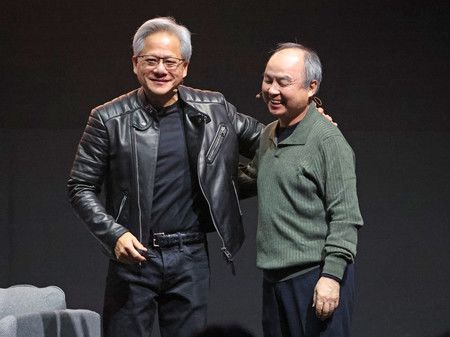That investment in Arm, a chip design company that went public last year, has been one of Softbank’s best investments in its history. Softbank took the company private in 2016 for $32 billion, and today that stake is worth roughly $130 billion. The stock has soared since its IPO last September on strong growth from AI-related demand and in the smartphone market.
Son, who had also invested in Nvidia (NASDAQ: NVDA) but regretfully sold his 5% stake in the chip stock back in 2019, now sees more opportunity in the AI sector. Softbank was one of several investors to participate in OpenAI’s latest funding round, investing $500 million into the ChatGPT creator as part of a round that values the start-up at $150 billion.
Son also made a bold statement on the future of AI at a recent conference.

Is Nvidia undervalued?
Speaking at the Future Investment Initiative, Son said, “I think Nvidia is undervalued.” He went on to explain that bearish estimates predict that artificial general intelligence (AGI) will only displace 5% of GDP 10 years from now, which is equal to $9 trillion based on expectations of GDP growth.
According to his thinking, that means that there will be $9 trillion in capital expenditures for those chips and data centers and that the AGI running on that infrastructure would be able to generate $9 trillion in revenue a year at a net profit margin of 50%, meaning it would make $4.5 trillion in profit.
Son also said that getting there would require 200 million chips and that it would demand 400 gigawatts, which is more than what the U.S. currently uses in electricity.
That might seem farfetched, but most tech revolutions seem that way beforehand.
The lesson from Masayoshi Son’s investments
The Softbank chief is known just as much for his failures as for his successes. He was a major investor in WeWork before the global coworking business blew up, and he lost $11.5 billion on that investment. In the dot-com bust, he also lost $77 billion in paper wealth at one point, at the time more money than anybody in history had lost.
But Son has made much more than that in his successes. Arm, for example, is up roughly $100 billion from Softbank’s investment in 2015, and he made $72 billion on Alibaba, starting from just a $20 million investment.
Growth stocks, especially those in emerging technologies, offer high risk and high reward. However, one winner can erase many losers, and one big winner can make you rich. After all, you can only lose 100% of your investment in a stock, but you can make 1,000%, 10,000%, or even more on rare occasions and with enough time. There is no limit to gains.
While Nvidia is too big at this point to be a 10-bagger, at least not without a very long time frame, it’s worth heeding Son’s advice on AI stocks as he also talked up the potential of artificial superintelligence, which would be 10,000 times smarter than a human, many times more powerful than AGI.
Son also continues to believe that Arm is a great investment, noting its dominant market share in smartphone and Internet of Things devices, and said it would become an AI-centric company very soon.
If Son is right about artificial general intelligence, and the market even approaches the $9 trillion figure he mentioned, Arm and Nvidia will both be big winners, and there will be plenty of others.
https://www.yahoo.com/finance/news/billionaire-investor-masayoshi-son-already-101500845.html





